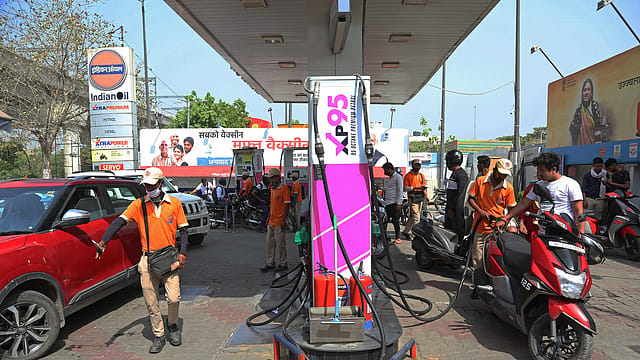E20 blended petrol causes a 'marginal decrease' in fuel efficiency: Govt
ADVERTISEMENT

The Ministry of Petroleum and Natural Gas on Tuesday clarified that 20% ethanol-blended petrol (E20) causes a marginal decrease in fuel efficiency which can be minimised through improved engine tuning.
This comes after several social media users reported a drop in their vehicles’ fuel efficiency in recent months as fuel pumps across the country started selling E20 petrol from earlier this year.
“Ethanol, being lower in energy density than petrol, results in a marginal decrease in mileage, estimated at 1–2% for four-wheelers designed for E10 and calibrated for E20, and around 3–6% in others,” the petroleum ministry said.
This marginal drop in efficiency can be further minimised through improved engine tuning and use of E20-compatible materials, which leading automobile manufacturers have already adopted, it said.
“The Society of Indian Automobile Manufacturers (SIAM) has confirmed that E20-compliant vehicles with upgraded components began rolling out from April 2023. Thus, the allegation that E20 leads to a drastic drop in fuel efficiency is factually incorrect,” the ministry clarified.
The government said that safety standards for E20, including corrosion inhibitors and compatible fuel system materials, are well established through the Bureau of Indian Standards (BIS) specifications and automotive industry standards.
The ministry said replacement of some rubber parts, gaskets could be advised in certain older vehicles after prolonged use of 20,000 to 30,000 kms. This replacement is inexpensive and easily done during regular servicing of the vehicle, it said.
In India, ethanol is increasingly being produced from not only sugarcane but also from surplus rice, maize, damaged foodgrains, and agricultural residues, especially under the push for second-generation (2G) biofuels. This makes ethanol blending not only technically viable, but environmentally sustainable as well, the government said.
E20 blending strengthens India’s energy security by reducing dependence on crude oil imports. In fact, since 2014-15, India has already saved more than ₹1.40 lakh crore in foreign exchange through petrol substitution, said the government. Ethanol blending supports the rural economy, with expeditious payment of over ₹1.20 lakh crore to farmers, thereby creating income and employment opportunities in the agricultural and biofuel sectors, the government said.
The ministry clarified that the narrative that ethanol blending in petrol is harming vehicles or causing undue hardship to consumers is “not based on real facts and lacks technical foundation.” “Ethanol blending is a forward-looking, scientifically supported, and environmentally responsible measure that brings multi-dimensional benefits to the nation,” it said.
“International studies on the effect of using Ethanol-Petrol Blends on Mechanical, Energy and Environmental Performance of Vehicles through testing of carbureted and fuel-injected vehicles every 10,000 km during their first 100,000 km showed statistically no significant differences in power and torque generated and fuel consumption,” it said.
The ministry cited a study on life cycle emissions of ethanol done by Niti Aayog which assessed that GHG emissions in case of sugarcane and maize-based ethanol use is less by 65% and 50%, respectively, than that of petrol.
Ethanol has a higher octane number than petrol (108.5 vs. 84.4), which implies that ethanol-petrol blends have a higher octane number than traditional petrol, the ministry said. “Therefore, the use of ethanol becomes a partial alternative for providing high-octane fuels, required for modern high-compression ratio engines providing a better ride quality,” it added.
Vehicles tuned for E20 (having increased RON) deliver even higher performance, the ministry said. “Ethanol is also characterised by having a higher heat of vaporisation than petrol. This aspect makes the temperature of the intake manifold lower, which increases air-fuel mixture density, therefore increasing the engine’s volumetric efficiency.”